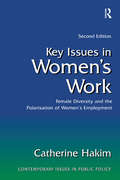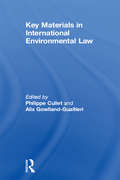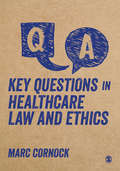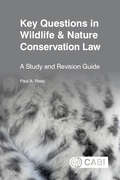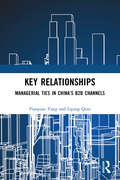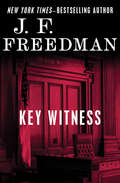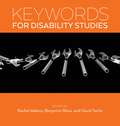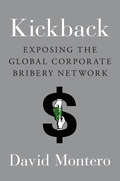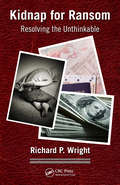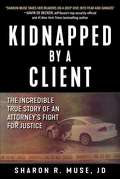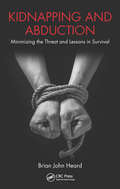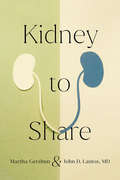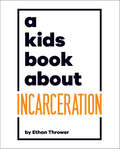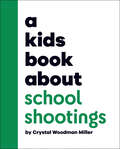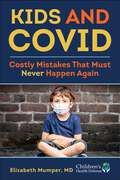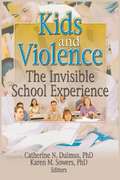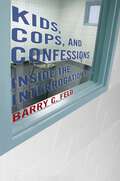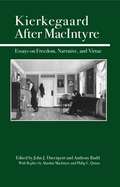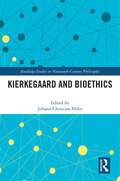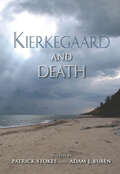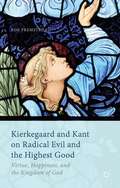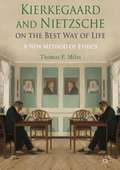- Table View
- List View
Key Issues in Women's Work: Female Diversity and the Polarisation of Women's Employment (Contemporary Issues in Public Policy #Vol. 4)
by Catherine HakimWomen's employment is one of the most widely-discussed and often-misunderstood issues of modern society. Are women today oppressed, or do they have the best of both worlds? Do women have to go out to work to gain equality with men, or do they already do more than their share of domestic work, caring work and voluntary work as well as work in the informal economy? Do women seek careers on the same terms as men, or are they content to be dependent wives or secondary earners taking jobs on a short-term basis? How important is job segregation in explaining the 20% pay gap between men and women? Have equal opportunities laws had any real impact? Are women in Europe lagging behind, or are they at the forefront of developments in modern societies? This new updated edition of Catherine Hakim's classic text addresses all the key issues currently debated in relation to women's work - in the domestic sphere, as well as paid employment. Dr Hakim tests the power of patriarchy theory and preference theory against economic theories. Sex discrimination, work-life balance, part-time work, flexible hours, homeworking, career patterns across the life cycle, labour mobility, labour turnover, the returns to education, occupational segregation, the pay gap, the glass ceiling, and the impact of European Union policies are all considered. Analysis of historical developments over the twentieth century, based on censuses, is complemented by case studies of people working in occupations undergoing dramatic change. Throughout the book, comparisons are drawn between the USA, Britain, other European countries, Canada, Australia, and also China, Japan and other Far Eastern societies. The analysis draws on sociology, economics, psychology, labour law, history and social anthropology to conclude that the diversity of women's life goals and lifestyle preferences is increasing. This explains the growing polarisation of women's employment and many contradictory recent research results.
Key Materials in International Environmental Law
by Alix Gowlland-GualtieriThis compilation of key materials in international environmental law takes account of the most significant developments in the field that have occurred during the past decade, including in the areas of climate change, chemicals and pesticides, biosafety, and nuclear safety, as well as good governance, compliance and liability. Not only does multilateral environmental law making have wide-ranging repercussions on the way national development policies are drafted and business is conducted, but also environmental issues increasingly interweave with those relating to human rights, trade, agriculture and intellectual property, making familiarity with the key instruments in international law essential for all working in these areas. The book comprises a representative selection of the most important studies in international environmental law, with an editorial introduction to each topic. Its focus on recent trends and cross-sectoral aspects makes it an indispensable tool for students, researchers, practitioners and policy makers in international environmental law and related fields.
Key Questions in Healthcare Law and Ethics
by Marc CornockThe perfect textbook for healthcare students who want a fresh, innovative way to understand how law and ethics relate to their studies, placements, and professional practice. By using a unique format made up of frequently asked questions and corresponding answers, Key Questions in Healthcare covers the what, why, where and how in legal and ethical issues related to healthcare. Its easy-to-use layout helps you quickly find informative yet straightforward answers to over 150 questions, helping you to feel confident in your legal and ethical knowledge, without leaving you overwhelmed or confused. All answers are written in-line with Nursing and Healthcare regulations and its conversational writing style will make you feel like you are talking with a lecturer, instructor, or knowledgeable colleague, rather than reading a textbook. The book is appropriate for all levels, from healthcare students in the initial stages of their education, to the advanced practitioner who wishes to refresh their knowledge, or maybe learn something new.
Key Questions in Healthcare Law and Ethics
by Marc CornockThe perfect textbook for healthcare students who want a fresh, innovative way to understand how law and ethics relate to their studies, placements, and professional practice. By using a unique format made up of frequently asked questions and corresponding answers, Key Questions in Healthcare covers the what, why, where and how in legal and ethical issues related to healthcare. Its easy-to-use layout helps you quickly find informative yet straightforward answers to over 150 questions, helping you to feel confident in your legal and ethical knowledge, without leaving you overwhelmed or confused. All answers are written in-line with Nursing and Healthcare regulations and its conversational writing style will make you feel like you are talking with a lecturer, instructor, or knowledgeable colleague, rather than reading a textbook. The book is appropriate for all levels, from healthcare students in the initial stages of their education, to the advanced practitioner who wishes to refresh their knowledge, or maybe learn something new.
Key Questions in Wildlife & Nature Conservation Law: A study and revision guide (Key Questions)
by Dr Paul ReesLaw plays an essential part in the conservation of wildlife and ecosystems. The study of wildlife and nature conservation law is an important component of a wide range of programmes of study including wildlife conservation, environmental management and environmental law. This book is a study and revision guide for students following such programmes. It contains 600 multiple choice questions (and answers) set at three levels - foundation, intermediate and advanced - and grouped into 10 major topic areas: 1. Principles of Wildlife and Nature Conservation Law 2. History of Wildlife and Nature Conservation Law 3. Species Protection and Exploitation I - EU and International Law 4. Species Protection and Exploitation II - National Laws 5. Protected Areas and Habitats I - EU and International Laws 6. Protected Areas and Habitats II - National Laws 7. Planning, Pollution, Restoration and Conservation Funding 8. Wildlife Trade, Animal Collections and Alien Species 9. Wildlife Law Enforcement and Penalties 10. Legal Texts This book has been produced in a convenient format so that it can be used at any time, in any place. It allows the reader to learn and revise the meaning of terms used in wildlife and nature conservation law and study the role of legislation at national, European Union (EU) and international level in the protection of individual species, habitats and landscapes. It uses examples from a wide variety of taxa, habitats and protected areas selected from a range of jurisdictions from the United Kingdom, the United States and Australia to Antarctica and the High Seas. Topics include the control of hunting, the conservation of trees and forests, the protection of National Parks and wilderness areas, wildlife trade and the organisations involved in the enforcement of wildlife laws. The structure of the book allows the study of one topic area at a time, progressing through simple questions to those that are more demanding. Some of the questions require students to use their knowledge to interpret information provided in the form of photographs and legal texts.
Key Relationships: Managerial Ties in China’s B2B Channels
by Pianpian Yang Liping QianThis book explores the governance and ramifications of managerial ties in China’s B2B contexts, with the aim of uncovering theoretical mechanisms and practical strategies for effective management of these relationships.In this book, managerial ties refer to personal relationships between corporate executives, business partners, and government or regulatory officials. While common in the Chinese business environment, these relationships are gaining recognition and value globally. Drawing on insights from four empirical studies, the authors focus on managerial ties within channel relationships among Chinese firms. The book analyzes how business and political ties affect channel outcomes, highlights the limitations of managerial ties in emerging markets, and identifies conditions or mechanisms that may lead to negative effects.This work will be valuable to researchers and students of business management and relationship marketing, as well as to business professionals interested in Chinese business practices and multinational companies operating in China.
Key Witness
by J. F. FreedmanA corporate lawyer defends a teenager charged with a horrifying crime in a &“powerfully absorbing tale of justice&” from a New York Times–bestselling author (Kirkus Reviews). After years at the top of his game, Wyatt Matthews has hit rock bottom. Though his bank account is bursting and his law practice is thriving, Wyatt takes no joy in his work. Seeking meaning, he volunteers for six months as a public defender, where he finds that the legal system is an ugly place for those who can&’t afford top-notch help. In one of his first cases, he arranges bail for a would-be gangster arrested for armed robbery. At first, Marvin White is just another file. But soon, his case will become a crusade. Not long after his release, Marvin is charged with murder. Seven women have been abducted, raped, and murdered by the &“Alley Slasher,&” and Marvin is found near the scene of the latest atrocity. Though Wyatt got in this business to better his own life, he will stop at nothing to save Marvin&’s.
Keywords for Disability Studies (Keywords #7)
by Rachel Adams David Serlin Benjamin ReissIntroduces key terms, concepts, debates, and histories for Disability StudiesKeywords for Disability Studies aims to broaden and define the conceptual framework of disability studies for readers and practitioners in the field and beyond. The volume engages some of the most pressing debates of our time, such as prenatal testing, euthanasia, accessibility in public transportation and the workplace, post-traumatic stress, and questions about the beginning and end of life.Each of the 60 essays in Keywords for Disability Studies focuses on a distinct critical concept, including “ethics,” “medicalization,” “performance,” “reproduction,” “identity,” and “stigma,” among others. Although the essays recognize that “disability” is often used as an umbrella term, the contributors to the volume avoid treating individual disabilities as keywords, and instead interrogate concepts that encompass different components of the social and bodily experience of disability. The essays approach disability as an embodied condition, a mutable historical phenomenon, and a social, political, and cultural identity.An invaluable resource for students and scholars alike, Keywords for Disability Studies brings the debates that have often remained internal to disability studies into a wider field of critical discourse, providing opportunities for fresh theoretical considerations of the field’s core presuppositions through a variety of disciplinary perspectives.Visit keywords.nyupress.org for online essays, teaching resources, and more.
Kickback: Exposing the Global Corporate Bribery Network
by David MonteroAn investigation into corporate bribery around the world and how it undermines democracy and the free market systemThe World Bank estimates that rich multinational corporations pay hundreds of billions of dollars in bribes every year to officials overseas. The perpetrators are not a handful of rogue companies, but many members of the Fortune 500. Kickback is a sweeping, global investigation into corporate bribery around the world and how backdoor financial transactions undermine democracy and the free market system by lining the pockets of some of the world's worst dictators and criminals. Ultimately, this system affects billions of people by creating conditions that lead to poverty, violence, environmental disaster, and political instability in countries like Nigeria, Bahrain, Costa Rica, and Iraq.Kickback traces the origins of corporate bribery from the reign of the British East India Company to the methods by which it is carried out today. Traveling across four continents and interviewing police and intelligence officials, convicted criminals, business executives, and corruption experts, David Montero takes an inside look at bribery's pernicious effects. He examines its ramifications at both the individual and national levels--from the murder of a young activist in Bangladesh to a Texas billionaire's dealings with Saddam Hussein, from pharmaceutical firms' payoffs in China to how the entrenched culture of bribery helped destroy the Greek economy. Montero also examines the countermeasures that have been introduced to combat these practices, such as the Justice Department's efforts to halt them and attempts to identify and provide restitution to victims.Given the new era of profound uncertainty we are entering--the strength of the European Union founders, the power of China rises, the global economy continues on a path of perilous flux, and allegations mount that President Donald Trump and his associates are possibly tainted by bribery themselves--the stakes for eradicating corporate bribery have never been higher.
Kid Pirates: Their Battles, Shipwrecks, & Narrow Escapes (Ten True Tales)
by Allan ZulloSome volunteered. Others were forced to serve. But each of these young people sailed with the world's most feared pirates -- from the notorious Blackbeard and Captain Kidd to Sir Henry Morgan and others. Some of these kids fought side-by-side with the pirates, and others tried to escape. You will never forget their incredible true stories.
Kidnap for Ransom: Resolving the Unthinkable
by Richard P. WrightThe enormous sums paid for the release of hostages coupled with law enforcement‘s inability to stem the tide has made kidnapping for ransom a worldwide plague. The increasing rate of reported incidents from every corner of the globe suggests this plague is growing. Kidnap for Ransom: Resolving the Unthinkable removes the veil of mystery and dispels
Kidnapped by a Client: The Incredible True Story of an Attorney's Fight for Justice
by Sharon R. Muse&“He promised to kill me when he got out. I believed him. If I wanted justice, I had to fight both him and the courts...maybe kill him first. If I didn&’t do something, I was going to die.&” This is not a manufactured dialogue from a thriller but the words of attorney Sharon Muse. They came after she survived an attempted kidnapping, rape, and murder at the hands of Larry Morrison, a former client. On April 7, 2006, Muse miraculously escaped from the sociopathic Morrison, only to find that the threat to her life was just beginning. Ineptitude in the justice system threatened to release Morrison and allow him the opportunity to finish the job, which he adamantly pledged to do. Muse would have to fight at every step to ensure her safety. Muse would act as her own advocate, investigator, legal counsel, and bodyguard in the years following the event. Kidnapped by a Client covers the brutal kidnapping, two trials, two appeals, procedural errors galore, one Supreme Court reversal, and even Muse&’s intricate plan to murder Morrison before he could get to her. Muse would not ultimately execute that plan, and she would emerge victorious in the legal battle thanks to her faith and her own determination and legal acumen. But her safety is not ensured: Morrison is up for parole in 2026. Muse regularly monitors his status. Muse recounts her stranger-than-fiction story in Kidnapped by a Client. Muse analyzes the failures of the legal system, the mistakes she made, the steps she took to protect herself, and how she has coped with trauma. Readers will find not only a compelling narrative, but also insight into how to protect oneself and ensure one&’s own safety and well-being.
Kidnapping and Abduction: Minimizing the Threat and Lessons in Survival
by Brian John HeardTerrorist groups and organized crime cartels pose an increasing threat of kidnapping throughout many regions in the word. At the same time, international travel has become more commonplace for both business and leisure purposes. Kidnapping and Abduction: Minimizing the Threat and Lessons in Survival provides a practical guide on the precautions tra
Kidney to Share (The Culture and Politics of Health Care Work)
by Martha Gershun John D. LantosIn Kidney to Share, Martha Gershun tells the story of her decision to donate a kidney to a stranger. She takes readers through the complex process by which such donors are vetted to ensure that they are physically and psychologically fit to take the risk of a major operation. John D. Lantos, a physician and bioethicist, places Gershun's story in the larger context of the history of kidney transplantation and the ethical controversies that surround living donors. Together, they help readers understand the discoveries that made transplantation relatively safe and effective as well as the legal, ethical, and economic policies that make it feasible. Gershun and Lantos explore the steps involved in recovering and allocating organs. They analyze the differences that arise depending on whether the organ comes from a living donor or one who has died. They observe the expertise—and the shortcomings—of doctors, nurses, and other professionals and describe the burdens that we place on people who are willing to donate. In this raw and vivid book, Gershun and Lantos ask us to consider just how far society should go in using one person's healthy body parts in order to save another person.Kidney to Share provides an account of organ donation that is both personal and analytical. The combination of perspectives leads to a profound and compelling exploration of a largely opaque practice. Gershun and Lantos pull back the curtain to offer readers a more transparent view of the fascinating world of organ donation.
Kids Book About Incarceration, A (A Kids Book)
by Ethan ThrowerIncarceration is a BIG topic. Start the conversation early around the power of choices, consequences, justice, and growth.Incarceration is a big word for a HUGE topic. It can bring up difficult questions and feelings—especially when it affects you directly. This book explores incarceration, crimes, and prison, as well as the power of choices. The author's story highlights the impact of choices and how someone can grow, learn, and change the path they've been on.
Kids Book About School Shootings, A (A Kids Book)
by Crystal Woodman MillerThis book will help kids better understand what school shootings are and the emotions that come with the what if.School shootings have become an increasingly common and tragic reality. And while they're not as common as they feel, they are still very real, and so is the fear, anxiety, and trauma that comes with the awareness of them. This book will help grownups and kids start important conversations about school shootings and encourage everyone to be prepared for emergencies while reminding us that we should never let fear take over our lives.
Kids and COVID: Costly Mistakes That Must Never Happen Again
by Elizabeth MumperKids and COVID provides an in-depth look at mistakes pandemic officials made that hurt children and adolescents around the world. In spring of 2020, it was understandable that those directing government policies made errors of judgment since data was just emerging. However, within the first year of the declared pandemic, physicians and scientists from around the globe published data and made reliable observations that should have prompted a change of course. Dr. Elizabeth Mumper documents early warnings from eminent clinicians that repurposed drugs could be used to treat patients early, rather than waiting until they had trouble breathing, as advised. Sound epidemiological evidence suggested in March 2020 that the mortality rate of COVID was far less than was reported on mainstream news. Doctors in the trenches treating patients warned of the dangers of hospital protocols, including giving remdesivir with its high rate of kidney damage and omitting appropriate doses of short-term steroids. These scientists and clinicians were gaslighted and accused of spreading &“misinformation.&” The most vulnerable—the young and elderly—suffered massive psychological damage as their social networks were dismantled. Immune function changed as beneficial microbes were disrupted. You may be surprised that what you learn in this book is quite different from what you were told. Kids and COVID calls on parents to organize grassroots efforts on behalf of their children to make global shutdowns and prolonged school closures a &“one and done&” phenomenon.
Kids and Violence: The Invisible School Experience
by Catherine Dulmus Karen SowersImplement prevention interventions and policies to curb the cycle of violence in our schools!Kids and Violence: The Invisible School Experience examines overt and covert violence occurring in the school setting involving students, school personnel, and school policy, and highlights a level of violence that is often hidden, ignored, or subtly tolerated. This book provides the latest research findings on various issues of violence in our schools. It also shows what happens when the adults responsible for the well-being of our children are actually perpetrating violence, staying silent about violence, or upholding a system that supports a violent atmosphere.Kids and Violence is unique in its holistic and systemic approach of examining types of violence that are often overlooked or endorsed by school policies. The book includes 11 chapters focusing on issues such as bullying, school personnel&’s role in violence, and prevention programs. The contributors are experts in their fields and include professors, deans, and directors of university social work schools. Kids and Violence presents the results of an exploratory study that examines self-identified bullies and addresses issues of immediate and vital importance, including: bullying among students, grades 3-8, in a rural school district observations by school personnel on bullying among elementary and middle school students corporal punishment as a cultural norm in the United States and its impact on discipline in our schools solution-focused crisis intervention with adolescents bullying of children and other abuses of power by school personnel adolescent dating violence in the school setting and much more!It is time to stop the harmful cycle of violence in our schools. This valuable resource serves as a call for immediate action, showing social workers and policymakers how to provide leadership in researching, developing, and delivering empirically-based prevention interventions and policies.
Kids, Cops, and Confessions: Inside the Interrogation Room (Youth, Crime, and Justice #3)
by Barry FeldJuveniles possess less maturity, intelligence, andcompetence than adults, heightening their vulnerability in the justice system.For this reason, states try juveniles in separate courts and use differentsentencing standards than for adults. Yet, when police bring kids in forquestioning, they use the same interrogation tactics they use for adults,including trickery, deception, and lying to elicit confessions or to produceincriminating evidence against the defendants.In Kids, Cops, and Confessions, Barry Feld offers thefirst report of what actually happens when police question juveniles. Drawingon remarkable data, Feld analyzes interrogation tapes and transcripts, policereports, juvenile court filings and sentences, and probation and sentencingreports, describing in rich detail what actually happens in the interrogationroom. Contrasting routine interrogation and false confessions enables police,lawyers, and judges to identify interrogations that require enhanced scrutiny,to adopt policies to protect citizens, and to assure reliability and integrityof the justice system. Feld has produced an invaluable look at how the justicesystem really works.
Kierkegaard After MacIntyre
by Alasdair Macintyre Philip L. Quinn John J. Davenport Anthony RuddIn his extraordinarily influential book on ethics, After Virtue, Alasdair MacIntyre maintained that Kierkegaard's notion of "choosing" to interpret one's choices in ethical terms implies an arbitrary and irrational leap. MacIntyre's critique of Kierkegaard has become the focal point for several new interpretations of Kierkegaard that seek to answer MacIntyre. Kierkegaard After MacIntyre brings together both new and already published articles in this vein, with a new reply by Professor MacIntyre.Kierkegaard After MacIntyre reflects the emergence of a new consensus in Kierkegaard scholarship. This consensus is strongly anti-irrationalist and contemporary neo-Aristotelian virtue ethics, clarifying their common ground as well as their differences.In responding to MacIntyre's 'irrationalist' objection, the authors clarify the sense in which Kierkegaard's own conception of freedom is teleological and suggest that his understanding of the development of ethical personality involves a quest for narrative unity, a commitment to practices involving social values, and a self-understanding conditioned by historical reality-all of which are also central themes in MacIntyre's work on virtue ethics. Despite MacIntyre's diagnosis of Kierkegaard's existential approach to ethics as unsuccessful, some of Kierkegaard's insights may support MacIntyre's own theses."Kierkegaard After MacIntyre is an outstanding book which brings Kierkegaard into direct conversation with one of the most important contemporary philosophers. The conversation contains both lively disagreements and illuminating analyses, all focused on issues of fundamental importance for human life." -C. Stephen Evans, Calvin College". . . this wonderfully edifying collection of essays." -Timothy P. Jackson, Emory University"In addressing MacIntyre's charge that for Kierkegaard the adoption of the ethical can only be a 'cirterionless choice,' this stimulating set of essays by well-known Kierkegaard scholars provides a welcome addition to the literature on Kierkegaardian ethics. Kierkegaard After MacIntyre provides a valuable exploration of the role of reasoning, will, and passion in moral life, as well as of the relation between aesthetic and ethical dimensions of life." -M. Jamie Ferreira, University of Virginia
Kierkegaard and Bioethics (Routledge Studies in Nineteenth-Century Philosophy)
by Johann-Christian PõderThis book explores Kierkegaard’s significance for bioethics and discusses how Kierkegaard’s existential thinking can enrich and advance current bioethical debates. A bioethics inspired by Kierkegaard is not focused primarily on ethical codes, principles, or cases, but on the existential 'how' of our medical situation. Such a perspective focuses on the formative ethical experiences that an individual can have in relation to oneself and others when dealing with medical decisions, interventions, and information. The chapters in this volume explore questions like: What happens when medicine and bioethics meet Kierkegaard? How might Kierkegaard’s writings and thoughts contribute to contemporary issues in medicine? Do we need an existential turn in bioethics? They offer theoretical reflections on how Kierkegaard’s existential thinking might contribute to bioethics and apply Kierkegaardian concepts to debates on health and disease, predictive medicine and enhancement, mental illness and trauma, COVID-19, and gender identity. Kierkegaard and Bioethics will be of interest to scholars and advanced students working on Kierkegaard, bioethics, moral philosophy, existential ethics, religious ethics, and the medical humanities.
Kierkegaard and Bioethics (Routledge Studies in Nineteenth-Century Philosophy)
by Johann-Christian PõderThis book explores Kierkegaard’s significance for bioethics and discusses how Kierkegaard’s existential thinking can enrich and advance current bioethical debates.A bioethics inspired by Kierkegaard is not focused primarily on ethical codes, principles, or cases, but on the existential 'how' of our medical situation. Such a perspective focuses on the formative ethical experiences that an individual can have in relation to oneself and others when dealing with medical decisions, interventions, and information. The chapters in this volume explore questions like: What happens when medicine and bioethics meet Kierkegaard? How might Kierkegaard’s writings and thoughts contribute to contemporary issues in medicine? Do we need an existential turn in bioethics? They offer theoretical reflections on how Kierkegaard’s existential thinking might contribute to bioethics and apply Kierkegaardian concepts to debates on health and disease, predictive medicine and enhancement, mental illness and trauma, COVID-19, and gender identity.Kierkegaard and Bioethics will be of interest to scholars and advanced students working on Kierkegaard, bioethics, moral philosophy, existential ethics, religious ethics, and the medical humanities.
Kierkegaard and Death
by Patrick Stokes andssss Adam J. Buben“This impressive [anthology] succeeds admirably at demonstrating how the Kierkegaardian corpus presents . . . a philosophy of finite existence” (Notre Dame Philosophical Reviews).Few philosophers have devoted such sustained, almost obsessive attention to the topic of death as Søren Kierkegaard. Kierkegaard and Death brings together new work on Kierkegaard’s multifaceted discussions of death and provides a thorough guide to the development, in various texts and contexts, of Kierkegaard’s ideas concerning death.Essays by an international group of scholars take up essential topics such as dying to the world, living death, immortality, suicide, mortality and subjectivity, death and the meaning of life, remembrance of the dead, and the question of the afterlife. While bringing Kierkegaard’s philosophy of death into focus, this volume connects Kierkegaard with important debates in contemporary philosophy.
Kierkegaard and Kant on Radical Evil and the Highest Good
by Roe FremstedalKierkegaard and Kant on Radical Evil and the Highest Good is a major study of Kierkegaard's relation to Kant that gives a comprehensive account of radical evil and the highest good, two controversial doctrines with important consequences for ethics and religion. Fremstedal offers an original account of Kierkegaard and his role in the history of philosophy that reconstructs several of his central ideas by relating them to Kant and partially also to contemporary debates. By offering a comparative presentation, the book shows how Kant and Kierkegaard offer different accounts of evil and its complex relations to religious faith and happiness. Fremstedal sheds new light on Kierkegaard's argument against secular thinking, and shows that there are more Kantian elements in Kierkegaard than has been acknowledged. Kierkegaard's use of Kantian ideas is instructive, since it points to problems with Kant's philosophy of religion and indicates how Kantian philosophy can be used to defend religious faith and hope.
Kierkegaard and Nietzsche on the Best Way of Life
by Thomas P. MilesKierkegaard and Nietzsche revive an ancient approach to ethics that evaluates different ways of life considered as a whole. Comparing and contrasting their respective ideals of faith and individual sovereignty, this work reveals a valuable new path for contemporary ethics.
